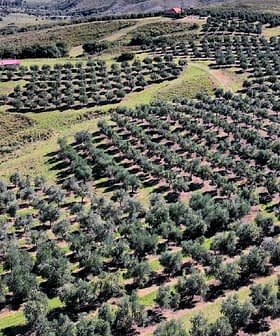Finca La Pontezuela and the University of Córdoba have joined forces on a research project investigating olive varieties well-adapted to drought.
On the 5‑hectare plantation, researchers will evaluate 12 olive varieties from Morocco, Tunisia, Italy, Greece, Turkey, Syria, Iran and Spain for the next five years.
The researchers will assess them based on their ability to adapt to weather extremes, including low rainfall and high temperatures, which are becoming increasingly common due to climate change.
See Also:New Olive Variety Will Revolutionize High-Density Plantations, Company ClaimsBased on their evaluations, researchers aim to determine the possibility of planting the olive varieties across Spain and potentially renew the agreement to continue research.
Juan Antonio Gómez-Pintado, Fina La Pontezuela’s president, said the project represents the first-of-its-kind project in Spain.
“It is the first time that a research project of these characteristics has been carried out in Spain, which unites a public university and a company, and which aims to study the adaptation of olive varieties from other countries to climate change for subsequent implementation in our country,” he said.
“This research will make it possible to advance in the knowledge of the tolerance of different olive varieties to water scarcity conditions, as well as the possible mechanisms involved,” added Carlos Trapero, a researcher from the University of Córdoba’s agronomy department.
After two years of severe drought and forest fires, studies concerning adapting different crops to hotter and drier conditions have become crucial for Spain’s agricultural industry.
Despite recent rainfall, Spain’s state meteorological agency (Aemet) said the country received 16 percent less rain in the current meteorological year, which began in October 2022, than the previous one.
Olive farmers across Andalusia, the world’s largest olive oil-producing region, have told Olive Oil Times that conditions in the groves this year are the same or worse than last year.
As olive oil growers pray for rain in September and October, the Spanish government has passed a €2 billion aid package for the agricultural sector to improve water infrastructure and provide direct aid to ranchers and farmers.
Farmers argue that financial aid is necessary to deal with Spain’s historic drought in the short term. Still, research into climate adaptation strategies remains critical to the sector’s future success.
Research is also underway in Andalusia and the Canary Islands, a volcanic archipelago off the coast of northwest Africa, to study the impact of the lack of chill hours on olive development and the oil quality of different popular Spanish varieties.
The flurry of new research projects comes as Carmen Crespo, Andalusia’s minister of agriculture, water and rural development, said the olive sector must become more resilient.
“We have a drought that is no longer temporary; it is structural in our region and, of course, affects the olive grove, our main crop,” she told Olive Oil Times in March.









